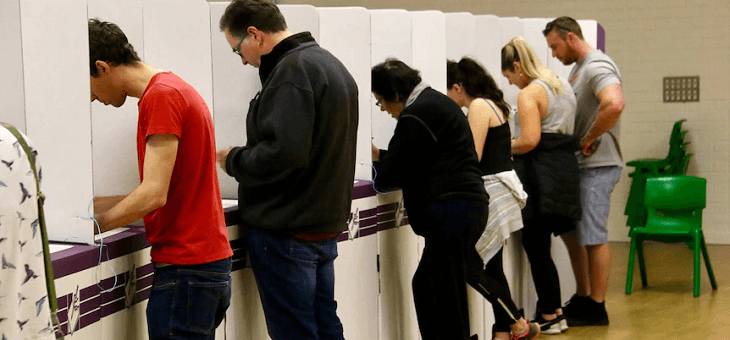There are roughly 300,000 active COVID cases in Australia. That’s a fair chunk of the voting population.
It also begs the question as election day draws nearer: how will you vote if you catch COVID in election week?
How do I vote if I catch COVID during election week?
Emergency telephone voting has been introduced for voters forced to isolate with COVID.
It’s something the Australian Electoral Commission (AEC) has been working on after the law was changed in February to allow people to vote over the phone.
Will I have to prove I have COVID?
Yes.
You will need to provide proof of a positive COVID test from either a PCR test or a rapid antigen test (RAT).
Tests must also be registered with your state or territory health authority.
Voters will need to provide proof of the date and time of their positive PCR result, or the serial number of their RAT.
How will telephone voting work?
The AEC says voters will have to go through a few steps to access telephone voting.
You will need to register on the AEC website.
Once there, you will need to provide evidence of being COVID positive and make a declaration about your eligibility.
You will then be matched to the electoral roll.
Checks will also be made to confirm that you have not already voted by telephone or another method.
When will I be able to vote over the phone?
The AEC says the service will be available to those who are required to be in COVID isolation for three days up to and including election day.
That’s Thursday May 19, Friday May 20 and Election Day, on Saturday May 21.
These days come right after the final date to register for a postal vote, which is Wednesday May 18.
Can I use this service if I don’t have COVID?
No.
Phone voting is a service that is usually only available to people who are visually impaired, or working in Antarctica.
Australian Electoral Commissioner Tom Rogers has stressed that turning out to voting centres is preferred.
“It is and will be an emergency measure for a very limited number of Australians,” Mr Rogers told the ABC in February.
“The absolute preference will be, if you can, you should be in the line rather than on the line.”
What if I’m a close contact?
Close contacts are no longer required to isolate in any Australian state or territory.
The AEC says it expects voters to follow local health guidelines when they vote.
Will I be talking to an automated machine?
No. Thousands of new staff have been hired to help with the process.
How do I know my vote will be taken down properly?
When we asked about phone voting, this is the first thing the AEC said:
“Electoral integrity is at the core of every aspect of the AEC’s service delivery and is paramount in our planning of the emergency telephone voting solution we’re delivering.”
They say phone voting will have the same level of supervision as every other voting service they run. They also said that their systems have undergone cybersecurity assessments.
“Telephone voting operators will be supervised and the voting process will be open to candidate and party-appointed scrutineers to observe,” they said.
“[It’s] a key part of the transparency of Australia’s election delivery.
“The ballot paper handling requirements in call centres will be subject to the same stringent ballot paper handling and reconciliation requirements as in-person polling places.”
The AEC said votes would only be counted under scrutineer observation following the secure return to divisional offices.
Sound like a hassle?
Pre-poll voting started on May 9.
You can vote early, either in person or by post for a whole range of reasons, including if you will be out of the electorate you are enrolled to vote in on voting day, are further than 8 kilometres from a voting booth, are seriously ill or about to give birth (or caring for someone who is), in hospital or prison, travelling or unable to leave work, or if you are a silent elector.
You can also vote early if you have a reasonable fear for your safety.
And, as mentioned earlier, the last date to register for a postal vote is on May 18.
Or you can turn out to vote on election day, Saturday May 21.
 © 2020 Australian Broadcasting Corporation. All rights reserved.
© 2020 Australian Broadcasting Corporation. All rights reserved.
ABC Content Disclaimer

